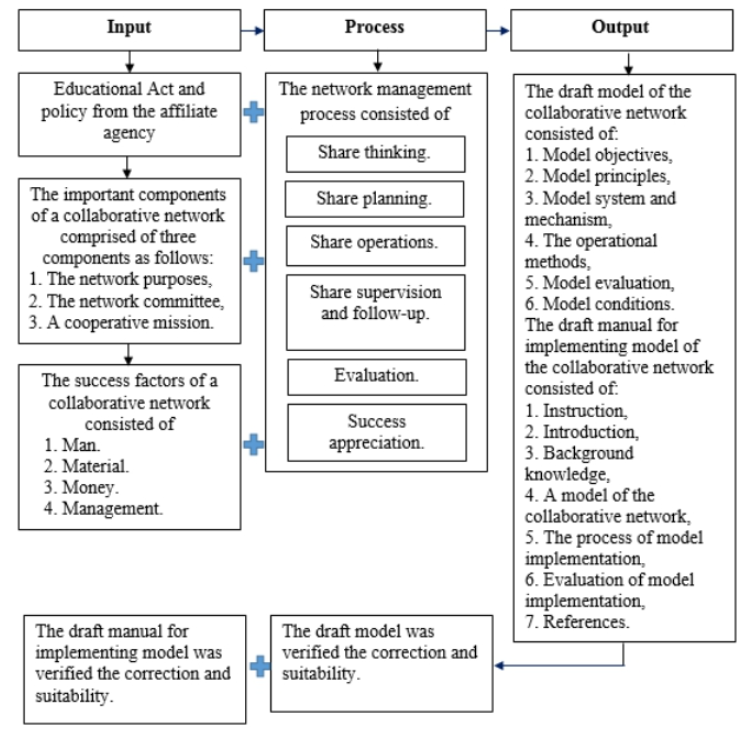Developing a Model of Collaborative Network for Promoting Learning Management Efficiency in Schools under Chiang Mai Primary Educational Service Area
Main Article Content
Abstract
This research aimed to 1) to identify network components, network management process, and the success factors; 2) to investigate conditions, problems, and the success factors, and 3) to develop a model and a manual for implementing model. Instruments used were a synthesized record form, a conformation questions, a five-rating scale questionnaire, and a verified form. Data were analyzed by frequency, mean, standard deviation, summarizing, synthesizing, and content analysis. Results of the research were as follows: 1) results of synthesizing consisted of the important network components, network management process, and the success factors; 2) results of investigating the conditions, problems, and the success factors, it was found that total average of the important network components and network management process in terms of conditions were at a low level, the problems were at a high level; and total average of the success factors of collaborative network in terms of the conditions were at a high level; and 3) results of a draft model consisted of six components verifying the correction and the suitability at 97.6 and 96.28 percent; the draft manual for implementing model consisted of seven components verifying the correction and the suitability at 93.49 and 92.65 percent.
Article Details
References
M. Daniel, A. Mel, C. Chris, W. Mel, Collaboration and networking in education, Springer, Dordrecht, 2011.
Office of the Education Council (ONEC), Research report: Model of management of basic education institutions. Bangkok. 2013.
A. Paul, Effective school partnerships and collaboration for school improvement: A review of the evidence research report. https://assets.publishing.service.gov.uk/government/uploads/system/uploads/attachment_data/file/467855/DFE-RR466_-_School_improvement_effective_school_partnerships.pdf (accessed 12 March 2020)
Y. Yongyouth, P. Choocheep, An excellent primary education school network consortium administration model in Chiang Mai Province, The Golden Teak: Humanity and Social Science Journal 26(4) (2020) 64 - 75. (in Thai)
Office of the Education Council (ONEC), The National Scheme of Education B.E. 2560-2579 (2017-2036). http://www.onec.go.th/us.php/home/category/CAT0001145 (accessed 12 March 2020)
K. Martin, How to Develop a Successful Collaborative network in and around Higher Education. https://sr.ithaka.org/blog/how-to-develop-a-successful-collaborative-network-in-and-around-higher-education (accessed 12 March 2020)
M. Chirapat, J. Vithaya, U. Tamronglak, Administrative Network Model for Academic Collaboration of Schools in Remote Highland Areas, Journal of Education Naresuan University 18(4) (2016) 114 - 127. (in Thai)
W-S. Jane, Four network principles for collaboration success, The Foundation Review 5(1) (2013) 121 - 129.
O. Wannapan, Success factors and Problems in the Project Management at Mahidol University International College, Journal of Professional Routine to Research 6 (2019) 1 - 8. (in Thai)
G. Namfon, Development of a collaborative network model enhancing basic education quality: A case of Phayao model, Journal of Humanities and Social Science Rajapruk University 3(2) (2017) 103 - 115. (in Thai)
B. Noppapadon, R. Ponnthep, C. Prissana, A proposed model for school network management of the Primary Educational Service Area Office, Phetchabun Rajabhat Journal 19(1) (2017) 14 - 21. (in Thai)
P. Phubet, P. Choocheep, A model of work-integrated learning to prepare educational administrators for Thailand, Interdisciplinary Research Review 15(3) (2020) 7 - 13.


